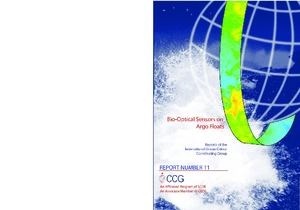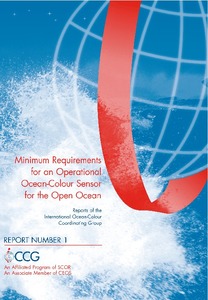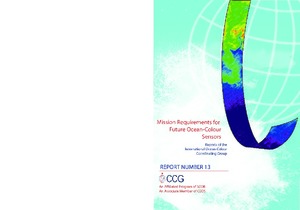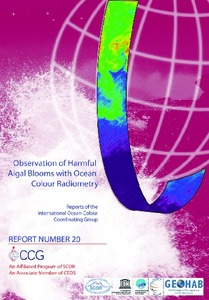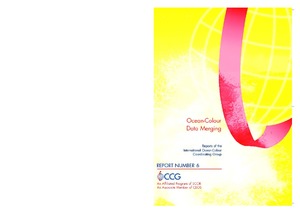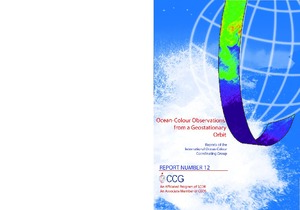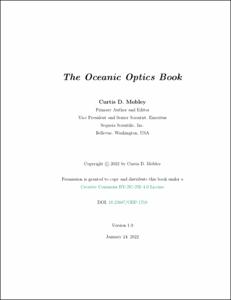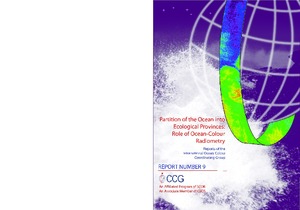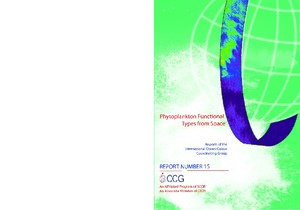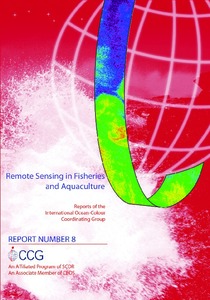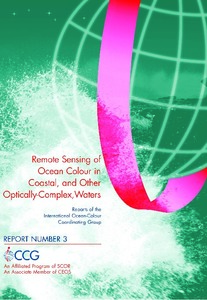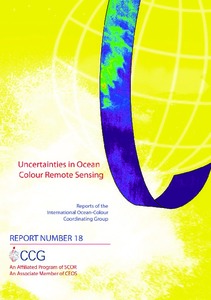Browsing IOCCG Community Practices by Author "IOCCG"
Now showing items 1-20 of 21
-
Atmospheric Correction for Remotely-Sensed Ocean-Colour.
Wang, Menghua; IOCCG (International Ocean Colour Coordinating Group (IOCCG), Dartmouth, NS, Canada, 2010)Atmospheric correction is a key procedure in remote sensing of ocean colour. This report provides an overview of the various atmospheric correction algorithms used for global ocean-colour data processing, and quantifies ... -
Bio-Optical Sensors on Argo Floats.
Claustre, Herve; IOCCG (International Ocean Colour Coordinating Group (IOCCG), Dartmouth, NS, Canada, 2011)Biogeochemical processes at the ocean surface have begun to be documented on unprecedented spatial and temporal scales thanks to the advent of satellite ocean-colour radiometry (OCR). These observation techniques have ... -
Earth Observations in Support of Global Water Quality.
Greb, Steven; Dekker, Arnold; Binding, Caren; IOCCG (International Ocean Colour Coordinating Group (IOCCG), Dartmouth, NS, Canada, 2018)Declining coastal, estuarine and inland water quality has become a global issue of significant concern as anthropogenic activities expand and climate change threatens to cause major alterations to the hydrological cycle. ... -
Guide to the Creation and Use of Ocean-Colour, Level-3, Binned Data Products.
Antoine, David; IOCCG (International Ocean Colour Coordinating Group (IOCCG), Dartmouth, NS, Canada, 2004)One of the goals of launching a number of ocean-colour sensors aboard various satellites is to build a long-term, multi-sensor, multi-year, ocean-colour archive. The derived chlorophyll concentrations (in time and space) ... -
In-flight Calibration of Satellite Ocean-Colour Sensors.
Frouin, Robert; IOCCG (International Ocean Colour Coordinating Group (IOCCG), Dartmouth, NS, Canada, 2013)Accurate radiometric calibration of space borne ocean-colour sensors is essential for retrieving geophysical variables (concentration of water constituents, inherent optical properties, aerosol content, etc.) quantitatively ... -
Minimum Requirements for an Operational, Ocean-Colour Sensor for the Open Ocean.
Morel, André; IOCCG (International Ocean Colour Coordinating Group (IOCCG), Dartmouth,NS, Canada, 1998)With the advent of increasingly-sophisticated satellite ocean-colour sensors in the late 1990’s, with better radiometric performances and in increased number of spectral channels, an IOCCG working group was formed to ... -
Mission Requirements for Future Ocean-Colour Sensors.
McClain, Charles R.; Meister, Gerhard; IOCCG (International Ocean Colour Coordinating Group (IOCCG), Dartmouth, NS, Canada, 2012)With the proliferation of complex and sophisticated ocean colour sensors now on orbit or planned for launch, this report seeks to establish the minimum basic radiometric and sensor requirements for global observations of ... -
Observation of Harmful Algal Blooms with Ocean Colour Radiometry.
Bernard, Stewart; Kudela, Raphael M.; Robertson Lain, Lisl; Pitcher, Grant; IOCCG (International Ocean Colour Coordinating Group (IOCCG), Dartmouth, NS, Canada, 2021)Harmful algal blooms (HABs) and eutrophication events have had a significant global impact over the past few years. The frequency of these events, and the geographic extent of toxic/harmful algal blooms have been increasing ... -
Ocean Colour Remote Sensing in Polar Seas.
Babin, Marcel; Arrigo, Kevin; Bélanger, Simon; Forget, Marie-Helene; IOCCG (International Ocean Colour Coordinating Group (IOCCG), Dartmouth, NS, Canada, 2015)Accelerating climate change calls for a vastly improved understanding of the polar ecosystems based on an intensive observation program. In situ observations from ships are, however, inherently sparse in space and time, ... -
Ocean-Colour Data Merging.
Gregg, Watson; IOCCG (International Ocean Colour Coordinating Group (IOCCG), Dartmouth, NS, Canada, 2007)There are several ocean colour radiometry missions currently in orbit. Significant improvements in spatial coverage and temporal resolution can be achieved by combining data from the various missions. This report details ... -
Ocean-Colour Observations from a Geostationary Orbit.
Antoine, David; IOCCG (International Ocean Colour Coordinating Group (IOCCG), Dartmouth, NS, Canada, 2012)Coastal zone monitoring requires dedicated, high spatial, high frequency coverage by satellite ocean colour sensors, rather than once per day global coverage, as provided by most current ocean colour missions. Observing ... -
The Oceanic Optics Book
Mobley, Curtis, D.; IOCCG (International Ocean Colour Coordinating Group (IOCCG), Dartmouth, NS, Canada, 2022)This book is a community resource on ocean optics. The development of the general theory requires many different concepts: radiometric variables, inherent optical properties (IOPs), apparent optical properties (AOPs), and ... -
Partition of the Ocean into Ecological Provinces: Role of Ocean-Colour Radiometry.
Dowell, Mark; Platt, Trevor; IOCCG (International Ocean Colour Coordinating Group (IOCCG), Dartmouth, NS, Canada, 2009)Ocean colour remote sensing can be used to the partition the ocean ecosystem into biogeochemical provinces to reveal its underlying functional structure. This report outlines the state of the art in ocean classification ... -
Phytoplankton Functional Types from Space.
Sathyendranath, Shubha; IOCCG (International Ocean Colour Coordinating Group (IOCCG), Dartmouth, NS, Canada, 2014)The concept of phytoplankton functional types has emerged as a useful approach to classifying phytoplankton and can be used to obtain a better understanding of ecological and biogeochemical processes. Recent developments ... -
Remote Sensing in Fisheries and Aquaculture.
Forget, Marie-Helene; Stuart, Venetia; Platt, Trevor; IOCCG (International Ocean Colour Coordinating Group (IOCCG), Dartmouth, NS, Canada, 2009)Satellite remote sensing of ocean colour provides operational information at the required resolution in time and space to be useful for the sustainable management of ocean ecosystems as well as providing information on the ... -
Remote Sensing of Inherent Optical Properties: Fundamentals, Tests of Algorithms, and Applications.
Lee, Zhong-Ping; IOCCG (International Ocean Colour Coordinating Group (IOCCG), Dartmouth, NS, Canada, 2006)Variations in inherent optical properties (IOPs), i.e., the scattering and absorption characteristics of water and its constituents (the dissolved and suspended material) are clear indications of changes in water mass or ... -
Remote sensing of ocean colour in coastal, and other optically-complex, waters.
Sathyendranath, Shubha; IOCCG (International Ocean Colour Coordinating Group (IOCCG), Dartmouth, NS, Canada, 2000)As we understand more about the optical properties of aquatic substances and their influences on ocean colour, it became possible to envisage the use of ocean-colour data to retrieve information on substances other than ... -
Status and plans for satellite ocean-colour missions: considerations for complementary missions.
Yoder, James A.; IOCCG (International Ocean Colour Coordinating Group (IOCCG), Dartmouth, NS, Canada, 1999)This report explains the utility of ocean colour data, summarizes technical requirements for global-scale, operational and scientific remote sensing of ocean colour in both Case 1 (open-ocean) and Case 2 (coastal) waters ... -
Synergy between Ocean Colour and Biogeochemical/ Ecosystem Models.
Dutkiewicz, Stephanie; IOCCG (International Ocean Colour Coordinating Group (IOCCG), Dartmouth, NS, Canada, 2020)The goal of this report is to improve the communication between numerical modellers and the ocean colour community. It provides non-expert accessible information about both ocean colour and biogeochemical and ecosystem ... -
Uncertainties in Ocean Colour Remote Sensing
Mélin, Frédéric; IOCCG (International Ocean Colour Coordinating Group (IOCCG), Dartmouth, NS, Canada, 2019)This report on "Uncertainties in Ocean Colour Remote Sensing" summarizes the state of the knowledge on uncertainties related to ocean colour (OC) products and identifies ideas and recommendations to achieve significant ...
 Repository of community practices in Ocean Research, Applications and Data/Information Management
Repository of community practices in Ocean Research, Applications and Data/Information Management

